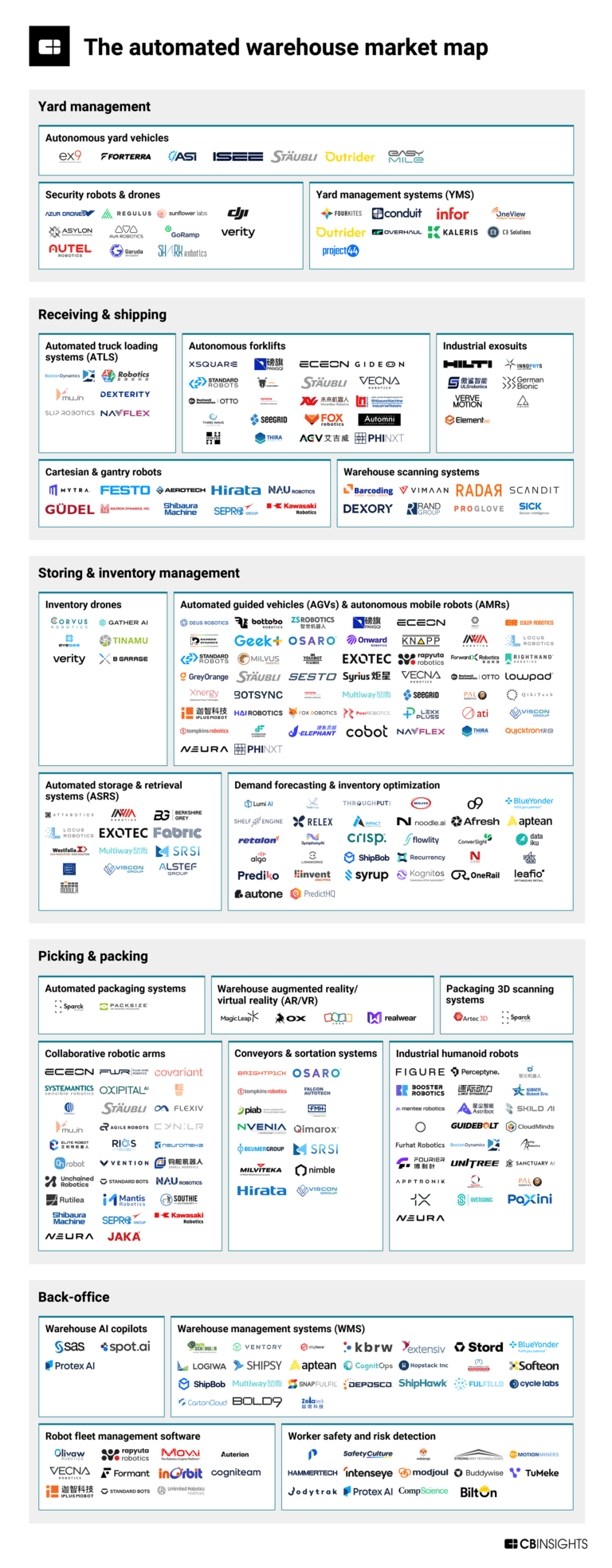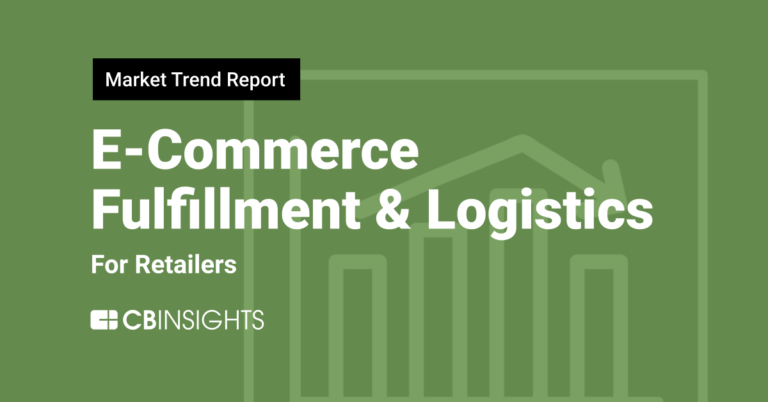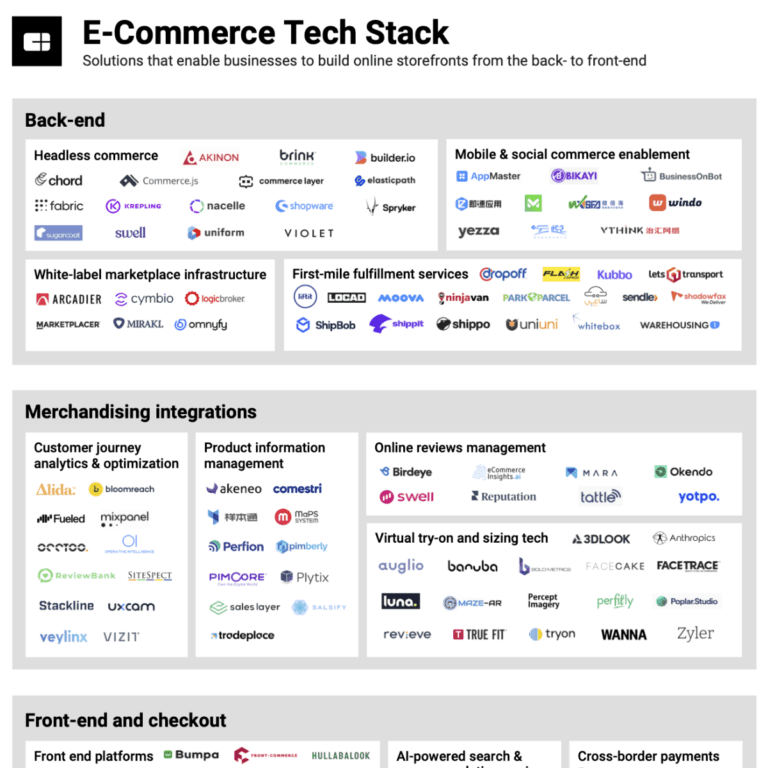
ShipBob
Founded Year
2014Stage
Series E | AliveTotal Raised
$331.1MValuation
$0000Last Raised
$200M | 4 yrs agoRevenue
$0000Mosaic Score The Mosaic Score is an algorithm that measures the overall financial health and market potential of private companies.
-46 points in the past 30 days
About ShipBob
ShipBob is a provider of e-commerce fulfillment solutions within the logistics and supply chain industry. The company offers services such as inventory distribution, order fulfillment, warehouse management, and global shipping options to assist the supply chain for online businesses. ShipBob primarily serves the e-commerce sector, offering solutions for delivery and inventory management. It was founded in 2014 and is based in Chicago, Illinois.
Loading...
ShipBob's Product Videos

_thumbnail.png?w=3840)
ESPs containing ShipBob
The ESP matrix leverages data and analyst insight to identify and rank leading companies in a given technology landscape.
The demand forecasting and inventory optimization market offers solutions that utilize sales data and other relevant metrics to drive inventory and supply chain planning improvements. These solutions use advanced technologies such as artificial intelligence and machine learning to forecast demand accurately across sales channels and help plan more efficient and cost-effective inventory ordering. T…
ShipBob named as Challenger among 15 other companies, including Oracle, RELEX, and SAP.
ShipBob's Products & Differentiators
ShipBob
A global omnichannel fulfillment solution
Loading...
Research containing ShipBob
Get data-driven expert analysis from the CB Insights Intelligence Unit.
CB Insights Intelligence Analysts have mentioned ShipBob in 4 CB Insights research briefs, most recently on Feb 13, 2025.

Feb 13, 2025
The automated warehouse market map
Expert Collections containing ShipBob
Expert Collections are analyst-curated lists that highlight the companies you need to know in the most important technology spaces.
ShipBob is included in 5 Expert Collections, including Supply Chain & Logistics Tech.
Supply Chain & Logistics Tech
6,028 items
Companies offering technology-driven solutions that serve the supply chain & logistics space (e.g. shipping, inventory mgmt, last mile, trucking).
Unicorns- Billion Dollar Startups
1,309 items
Retail Tech 100
100 items
The most promising B2B tech startups transforming the retail industry.
E-Commerce
217 items
Tech IPO Pipeline
257 items
The tech companies we think could hit the public markets next, according to CB Insights data.
Latest ShipBob News
Oct 24, 2025
Digital logistics is democratic logistics Copied For years, the logistics industry has been dominated by major global operators with deep capital reserves, vast networks, and proprietary technology. Smaller freight forwarders, transport companies, and 3PLs were often left competing on price alone, constrained by manual workflows and limited visibility. That imbalance is changing fast. Digitalisation is dismantling the barriers that once favoured scale over agility. Affordable, cloud-based logistics systems, AI-driven visibility tools, and digital freight platforms are enabling smaller logistics firms to compete - and often outperform - their larger counterparts. For logistics professionals, this shift isn’t just about technology adoption. It’s about redefining competitiveness. The winners of tomorrow’s logistics landscape won’t necessarily be the biggest - they’ll be the most connected, the most data-driven, and the most responsive. Digital Freight Marketplaces: Expanding Access to Global Trade One of the clearest signs of democratisation in logistics is the rise of digital freight marketplaces. Platforms like Freightos, Flexport, and Convoy give smaller logistics providers direct access to global cargo demand without needing massive sales teams or legacy networks. Through these platforms, smaller players can quote instantly, manage shipments digitally, and access transparent rate benchmarking. The technology automates key functions - documentation, tracking, and performance analytics - that were once handled manually or via expensive enterprise systems. The impact is huge: small forwarders and carriers can now compete for international shipments on equal terms with multinational operators. They can also leverage marketplace data to refine pricing strategies, forecast capacity, and identify profitable lanes - all through real-time analytics that used to be out of reach. Digital marketplaces are effectively transforming capacity into a digital commodity. For smaller operators, this means visibility and access—not just in local markets, but on a global scale. Cloud Automation: Unlocking Efficiency Without Heavy Infrastructure For smaller logistics companies, operational efficiency has always been the biggest constraint to scale. Managing freight documents, billing, customs, and customer communication manually eats into margins and limits growth. Cloud automation is changing that equation. Platforms like ShipBob and Project44 allow logistics SMEs to manage orders, inventory, and shipments through unified dashboards. With automated workflows and integrated communication, teams can handle higher shipment volumes with fewer resources. Cloud-based Transportation Management Systems (TMS) now provide capabilities - route optimisation, carrier selection, predictive ETAs - that used to require significant investment in IT infrastructure. For instance, Transporeon’s TMS enables real-time freight visibility and automated rate management accessible from any device. By digitising core operations, smaller logistics firms can operate lean while maintaining the same performance standards as large-scale providers. The result is a new kind of competitiveness: low-overhead, high-efficiency logistics operations that thrive on flexibility and responsiveness. Data Intelligence: Giving Smaller Firms Strategic Insight Logistics professionals know that visibility isn’t just about tracking, it’s about insight. For smaller players, the ability to access and interpret supply chain data used to be limited. Today, AI-driven analytics tools are levelling that field. Solutions like FourKites and Overhaul use machine learning to predict disruptions, estimate arrival times, and identify inefficiencies. This kind of intelligence, previously locked within enterprise-grade control towers, is now accessible via subscription-based platforms. Smaller 3PLs and carriers can use these insights to improve on-time performance, allocate resources efficiently, and proactively manage exceptions. The shift from reactive to predictive logistics management allows smaller firms to offer the kind of reliability and transparency that customers increasingly demand. In practical terms, this means a regional freight company can now deliver the same data visibility and service reporting as a multinational, without building a proprietary analytics team. Interoperability: Collaboration Through Integration One of the most powerful outcomes of digitalisation is interoperability. Open APIs and integration tools now allow even small logistics providers to connect seamlessly with partners, customers, and software ecosystems. Platforms like CargoWise exemplify this shift. By integrating customs compliance, accounting, warehouse management, and shipment tracking into a single digital environment, smaller operators can provide end-to-end visibility and compliance at a fraction of the traditional cost. This interconnectedness fosters collaboration rather than competition. Smaller firms can plug into digital supply chain ecosystems, share data in real time, and participate in larger logistics networks without losing autonomy. The ability to integrate digitally means smaller logistics providers can act as agile extensions of global supply chains—offering local expertise and flexibility, supported by enterprise-grade technology. Agility as the New Competitive Advantage Digitalisation is redefining what it means to be competitive in logistics. Scale still matters, but agility is emerging as the true differentiator. Smaller firms, empowered by digital tools, can adapt faster to market shifts, regulatory changes, and customer expectations. When a major disruption occurs - a port strike, a sudden demand surge, or a regulatory update - digitally enabled small operators can reroute, reprice, or reallocate capacity in hours, not days. They can deliver custom solutions where larger enterprises are bound by complex hierarchies and slower decision-making. Digitalisation is, in effect, democratising logistics by shifting the balance of power toward the agile and the connected. The Takeaway For logistics professionals, the message is clear: digitalisation is no longer a luxury - it’s the foundation of competitiveness. Cloud technology, data analytics, and digital platforms are giving smaller logistics companies access to tools that once required enterprise-level investment. The playing field is being levelled, and the rules of the game are changing. Success in the logistics sector will no longer depend on who has the most trucks, warehouses, or global offices - it will depend on who can move the fastest, see the furthest, and connect the smartest. Digitalisation isn’t just modernising logistics - it’s democratising it. And the small players who embrace it today are poised to shape the industry’s next chapter.
ShipBob Frequently Asked Questions (FAQ)
When was ShipBob founded?
ShipBob was founded in 2014.
Where is ShipBob's headquarters?
ShipBob's headquarters is located at 120 North Racine Avenue, Chicago.
What is ShipBob's latest funding round?
ShipBob's latest funding round is Series E.
How much did ShipBob raise?
ShipBob raised a total of $331.1M.
Who are the investors of ShipBob?
Investors of ShipBob include Hyde Park Venture Partners, Hyde Park Angels, Bain Capital Ventures, Menlo Ventures, SoftBank and 13 more.
Who are ShipBob's competitors?
Competitors of ShipBob include THG Ingenuity, Packsmith, Cart.com, Ware2Go, Locad and 7 more.
What products does ShipBob offer?
ShipBob's products include ShipBob.
Who are ShipBob's customers?
Customers of ShipBob include Touchland, TB12, 100 Thieves, Dossier and The Caker.
Loading...
Compare ShipBob to Competitors

ShipMonk is a third-party logistics provider that offers order fulfillment, inventory management, shipping management, and warehouse management services. The company serves the ecommerce industry, providing solutions for direct-to-consumer, business-to-business, and retail fulfillment needs. It was founded in 2018 and is based in Fort Lauderdale, Florida.
Packsmith provides logistics solutions for the e-commerce sector. It offers a distribution platform that focuses on order fulfillment and delivery, supported by industry expertise. It serves the e-commerce industry, providing logistics strategies, supply chain consulting, and integration support. It was founded in 2021 and is based in Sacramento, California.
Hive is a company involved in e-commerce operations and fulfillment services within the logistics sector. The company provides services including order fulfillment, inventory management, freight forwarding, delivery, custom packaging, and returns handling for accessories, food supplements, and cosmetics brands, as well as for enterprises of different sizes, including those on platforms like Shopify and WooCommerce. Hive was formerly known as Hive Logistics GmbH. It was founded in 2020 and is based in Berlin, Germany.

Stord is a commerce enablement platform that provides omnichannel fulfillment and shipping solutions within the logistics and supply chain industry. The company offers software tools, including order management and warehouse management systems, to assist with operations and the pre-purchase and post-delivery consumer experience. Stord serves direct-to-consumer (DTC) and business-to-business (B2B) sectors with a focus on health and beauty, nutrition and supplements, and apparel and accessories. It was founded in 2015 and is based in Atlanta, Georgia.

Flowspace is an e-commerce logistics and fulfillment company that specializes in providing cloud-based software and services for brands. The company offers a suite of tools for inventory management, order management, and network optimization to streamline fulfillment operations. Flowspace primarily serves the e-commerce industry, enabling brands to meet customer expectations for fast and efficient delivery. It was founded in 2017 and is based in Los Angeles, California.
Everstox focuses on providing B2B and e-commerce logistics solutions in the consumer goods industry. The company offers a range of services, including fulfillment of direct-to-consumer and B2B orders, shipping services, and warehousing services. Its services are primarily targeted towards e-commerce brands and enterprises. It was founded in 2019 and is based in Munich, Germany.
Loading...


